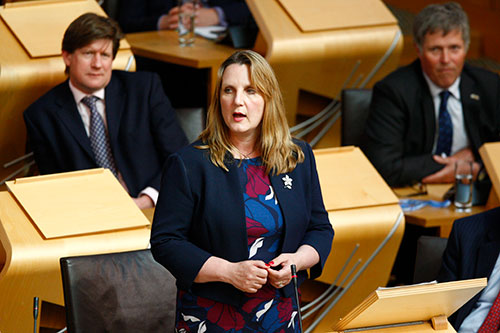Wednesday October 23rd 2019

Written by Michelle Ballantyne, South Scotland MSP
“There shall be a Scottish Parliament.”
Those were the words first spoken to mark the reconvention of the Scottish Parliament in 1999. It’s been 20 years since we began our devolution journey, and now seems like a reasonable juncture to assess exactly how that has worked in delivering for the people of Scotland.
Devolution has been an undeniable a force for good in many ways; it has allowed us to tackle many of the unique challenges facing our nation with our own solutions. Through devolution, we’ve established programmes to tailor our public services, promote Scottish industries and effect social issues.
We’ve shown that devolution, and the Scottish Parliament, can produce positive change in Scotland, but are we content with how our political system operates?
Since joining the Scottish Parliament in 2017, I’ve been surprised by some aspects of my role. Perhaps the biggest surprise is how little time the Scottish Parliament actually spends legislating.
Two weeks ago, the Scottish Government passed its flagship Transport Bill. The legislation will see a lot of changes brought in from where motorists can drive and park as well as policy commitments to invest governmental resources in areas such as smart ticketing.
It’s a testament to the benefits of devolution that we can pass legislation of this nature with far-reaching consequences, however, I’m sure many readers will agree with me that the nature of how the bill was passed is concerning.
All legislation at the Scottish Parliament has to pass through three stages. The first of which is at a cross-party committee, where a handful of MSPs scrutinise the bill and vote on amendments. For the Transport Bill, the convenor of the group had to request an extension at this stage as the Scottish Government hadn’t allowed enough time for the members to adequately assess the bill.
Then at stage two of the bill, the SNP Government forced the Workplace Parking Levy into the bill. The proposals went through no consultation, the committee responsible had no opportunity to take evidence from stakeholders and those who did raise concerns, such as the Scottish Police Federation, were widely ignored.
By the final stage of the bill, the majority of MSPs have engaged with the legislation and the debating chamber is full so members can vote on amendments. For this bill, there were nearly 200 amendments to be discussed, debated and decided; eight of which were my amendments to exempt people with disabilities as well as benefit claimants who couldn’t afford the tax- and these were rejected. As one of only seven bills to go through the Scottish Parliament this year, the stage 3 debates are incredibly important to the legislative process. It’s arguably where taxpayers should see a return on their investment from Holyrood.
This is why I was incredibly disappointed to see that only seven hours were dedicated to this process. I think that it says volumes about our legislative procedure that only seven hours was dedicated to voting on laws that actually make a day-to-day difference to everyone’s lives. Yet when Parliament resumes, we’re set to have seven hours to ‘debate’ motions that aren’t legally binding, will make little difference to anyone’s lives and will likely not be heard by anyone outside the political bubble.
I, like many, got into politics because I wanted to help improve people’s lives. The advent of devolution opened the door to making inspiring change in Scotland and gave us all the tools we need. I just can’t help but wonder whether we’re using them as effectively as we should.
Tweet Share on Facebook